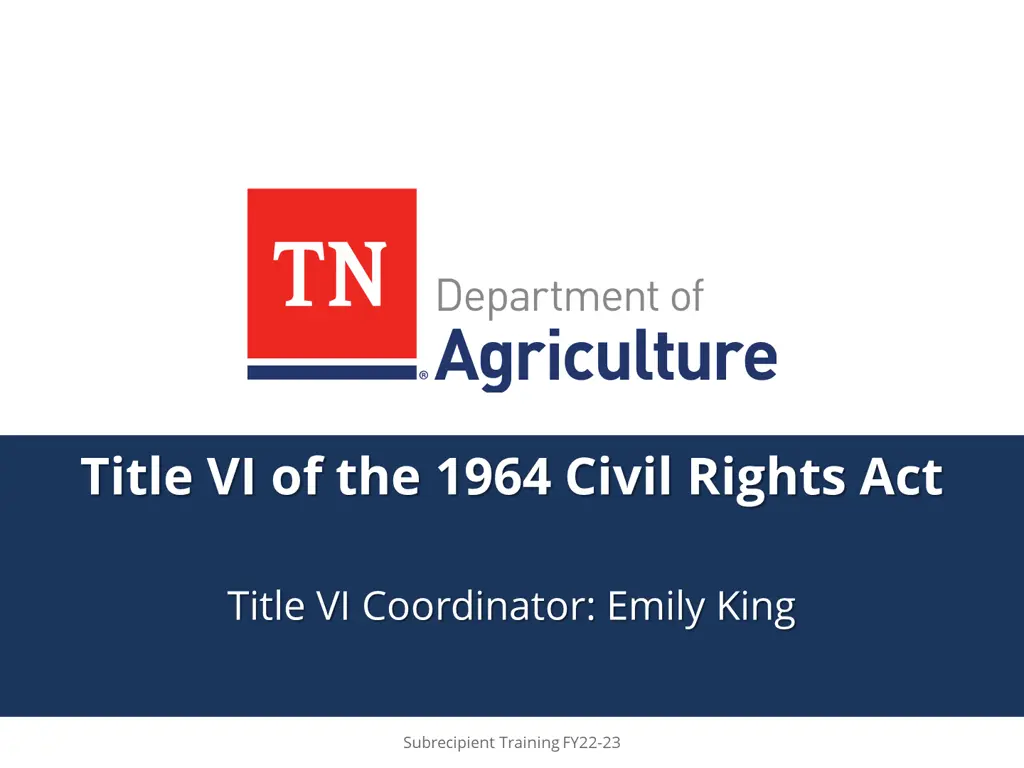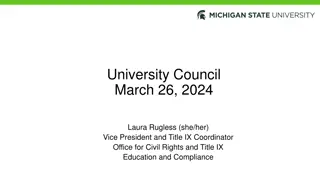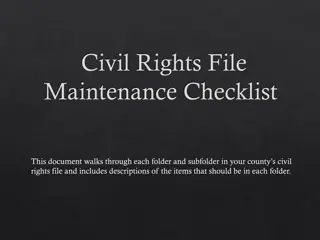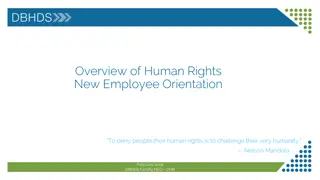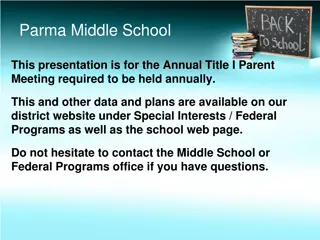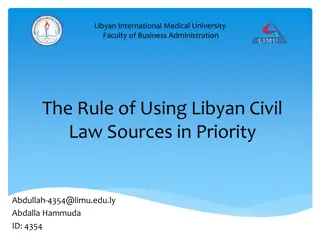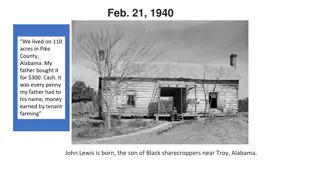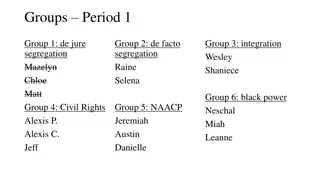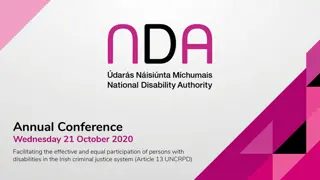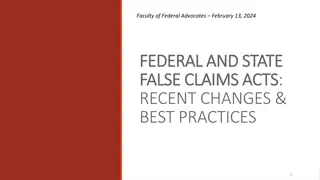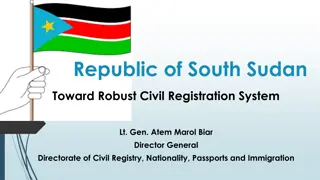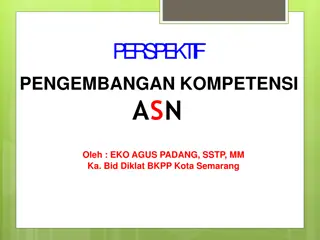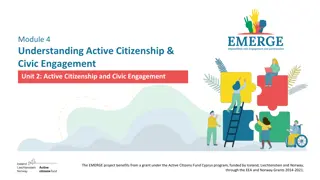Title VI of the 1964 Civil Rights Act
This training ensures sub-recipients are aware of Title VI provisions and compliance requirements under the Civil Rights Act of 1964.
Download Presentation
Please find below an Image/Link to download the presentation.
The content on the website is provided AS IS for your information and personal use only. It may not be sold, licensed, or shared on other websites without obtaining consent from the author. Download presentation by click this link. If you encounter any issues during the download, it is possible that the publisher has removed the file from their server.
Presentation Transcript
Title VI of the 1964 Civil Rights Act Title VI Coordinator: Emily King Subrecipient Training FY22-23
Purpose of This Training This training is conducted to ensure all sub-recipients of financial assistance are aware of the provisions of Title VI of the Civil Rights Act of 1964 and the minimum requirements to be in compliance with its rules, laws, and regulations. Objectives: Introduction to Title VI; Provide information and examples of what Title VI requires of TDA; and Describe your role in ensuring TDA complies with Title VI.
What is Title VI? Federal Law (42 U.S.C. 2000d): Title VI of the Civil Rights Act of 1964 ensures that no person in the United States shall, on the grounds of race, color or national origin, be excluded from participation in, be denied the benefit of, or be subjected to discrimination under any program or activity receiving federal financial assistance. Tennessee Law Tennessee Code Annotated 4-21-904
Details of Title VI of the Civil Rights Act of 1964 A number of federal non-discrimination laws have been created in our country to uphold the civil and constitutional rights of all Americans. One of these laws, the Civil Rights Act of 1964, lays the foundation for prohibiting discrimination based on race, color, religion, sex, or national origin.
Details of Title VI of the Civil Rights Act of 1964 The Civil Rights Act of 1964 consists of several components, but one that is particularly relevant to TDA s work is Title VI. Title VI ensures that no person in the United States shall, on the grounds of race, color, or national origin, be excluded from participation in, be denied the benefit of, or be subjected to discrimination under any program or activity receiving direct or indirect federal financial assistance. As a recipient of federal funding throughout many parts of the department, TDA employees and subrecipients are required to comply with the rules, laws, and regulations of Title VI.
How Title VI Applies to TDA While Title VI is a federal law, it applies to any recipient (federal, state, local, or private sector) of federal financial assistance. TDA is a recipient of federal financial assistance, i.e., funding from the USDA, FDA, and EPA, all federal agencies. Federal financial assistance is aid that enhances the ability to improve or expand allocation of a recipient s resources. This includes student aid, training of employees, grants, loans, tax-exempt bonds, property, loan of personnel, tax incentives, and technical assistance.
Title VI Responsibilities of Recipients Title VI applies to activities throughout an agency, not just to actions involving the federally assisted program. Therefore, if an agency receives any federal financial assistance for any program or activity the entire agency is required to comply with Title VI, not just that particular program.
Ensuring Compliance TDA must ensure that all contractors, subcontractors, and subrecipients awarded TDA funded contracts and grants adhere to Title VI and all other applicable civil rights laws and regulations. This responsibility is owned by all programs and divisions who administer procurement contracts and manage grant programs.
Ensuring Compliance To verify that all federally funded state agencies comply with Title VI, T.C.A. 4-21-203 requires the Tennessee Human Rights Commission (THRC) to review Title VI monitoring and enforcement procedures. The THRC requires agencies, including TDA, to annually review, evaluate, and report on its Title VI programs. The THRC also requires agencies like TDA to periodically review, evaluate, and report on subrecipients Title VI training and compliance.
Examples of Title VI Violations Restricting an individual in the enjoyment of services, facilities or any other advantage, privilege or benefit provided to others based on race, color, or national origin. Example: Denying Asian Americans and Hispanic Americans the ability to apply to funding through the Agricultural Enterprise Fund (AEF) program but permitting white Americans and black Americans to apply for AEF funding. Failure to provide customers with limited English proficiency necessary information in a language other than English where important services or rights are at stake. Example: Failing to provide language assistance services to a respondent who is of limited English proficiency in an administrative hearing.
Title VI Complaint Process Individuals who feel that they have been discriminated against based on their race, color, or national origin may file a complaint with the subrecipient, TDA, or THRC within 180 days of the alleged occurrence or when the alleged discrimination became known to the complainant. Complaints filed against the contractor (doing business with TDA) or subrecipient (who is recipient of funding from TDA) should be forwarded to TDA for investigation.
Title VI Complaint Process Upon receipt of complaint, TDA will determine the jurisdiction, acceptability, and the need for additional information to investigate the merit of the complaint. Following investigation, TDA will take final action within 60 days and provide a decision and appeal instructions to the complainant. Complaints should be forwarded to: Emily King, TDA Title VI Coordinator 424 Hogan Road, Nashville, TN 37220 Emily.King@tn.gov
Limited English Proficiency (LEP) Executive Order 13166 clarifies the existing requirements to serve LEP persons under Title VI treating people differently based on English language ability can be a type of national origin discrimination. Individuals who do not speak English as their primary language and who have a limited ability to read, speak, write, or understand English can be limited English proficient, or LEP. These individuals may be entitled to language assistance with respect to a particular type of service, benefit, or encounter. As a recipient of federal financial assistance, TDA adopts and implements a LEP plan.
TDA LEP Plan Provide language assistance at no cost to the customer. Preferred option: contracting with a telephone interpreter service (State of Tennessee wide contract) Other options (limited circumstances) : Hiring bilingual staff for client contact positions Hiring staff interpreters Contracting for interpreter services Engaging community volunteers Ensures meaningful access to programs and activities of LEP persons. Aligns with providing excellent customer service.
Elements of an LEP Plan Subrecipients of financial assistance are encouraged to adopt and implement a LEP plan. The following are elements of a strong LEP plan. Identify actions already being taken and existing tools that can be used to provide meaningful access (LEP contact, program staff, and Title VI Coordinator). Inventory existing materials that have been translated into other languages (LEP contact, program staff, and Title VI Coordinator) Staff awareness of : Obligation to provide language assistance to LEP persons LEP points of contact to be contacted in order to access language assistance services. Identification of responsibility for maintain language assistance service usage totals for ongoing evaluation and compliance reporting.
Title VI Noncompliance Consequences Withholding of payments to TDA under the grant or contract until compliance achieved; and/or Cancellation, termination or suspension of TDA s grant or contract, in whole or in part. TDA s receipt of federal funding is contingent upon Title VI compliance. Thus, it is extremely important for all TDA staff to assist with compliance. Failing to comply with the requirements of Title VI may also result in subrecipients funding being withheld, cancelled, terminated, or suspended.
TDA Public Participation Strategy Engage the public to raise awareness of TDA projects or services and to provide stakeholders with the meaningful opportunity to provide input during the decision-making process. Public Meetings/Hearings in centralized locations Advertisement with Local Media Resources and Minority Newspapers Website Information Posters Public participation is applicable throughout the department and impacts the work of all divisions Animal Health, Business Development, Consumer and Industry Services, and Forestry.
Questions? Emily King, TDA Title VI Coordinator 424 Hogan Road, Nashville, TN 37220 Emily.King@tn.gov
TITLE VI COORDINATOR Emily King 424 Hogan Road, Nashville, TN 37220 Email: Emily.King@tn.gov
